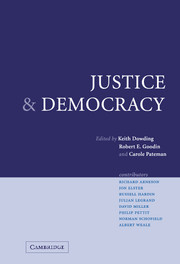Book contents
- Frontmatter
- Contents
- List of figures
- List of contributors
- 1 Introduction: between justice and democracy
- 2 Are democratic and just institutions the same?
- 3 Democracy is not intrinsically just
- 4 ‘The probability of a fit choice’: American political history and voting theory
- 5 Contractarian theory, deliberative democracy and general agreement
- 6 Democracy, justice and impartiality
- 7 Mimicking impartiality
- 8 Justice, democracy and public goods
- 9 The common good
- 10 Individual choice and social exclusion
- 11 Subnational groups and globalization
- References
- Brian Barry's publications
- Index
11 - Subnational groups and globalization
Published online by Cambridge University Press: 22 September 2009
- Frontmatter
- Contents
- List of figures
- List of contributors
- 1 Introduction: between justice and democracy
- 2 Are democratic and just institutions the same?
- 3 Democracy is not intrinsically just
- 4 ‘The probability of a fit choice’: American political history and voting theory
- 5 Contractarian theory, deliberative democracy and general agreement
- 6 Democracy, justice and impartiality
- 7 Mimicking impartiality
- 8 Justice, democracy and public goods
- 9 The common good
- 10 Individual choice and social exclusion
- 11 Subnational groups and globalization
- References
- Brian Barry's publications
- Index
Summary
Far too much of the concern with subnational groups, either long established (and even indigenous) or recently immigrated, is with abstract principles of justice. Far too little of it is about making societies work at all well to give prosperity to everyone and to do so through democratic procedures. Many of the ostensible principles of justice erect barriers between various groups, minority and majority. Assimilationist arguments, pro and con, typically assume assimilation of the minority or new group into the majority or established group. American, Canadian and Australian experience during the twentieth century clearly shows that assimilation goes both ways. Those from Northern European backgrounds in these nations have substantially assimilated with the newly arriving groups of Asians, Latinos and others. There is a substantial shortfall in the assimilation in both directions of blacks in the USA and of indigenous peoples in all three of the former colonial outposts.
Brian Barry (2001) is among the few writers who have forcefully taken on these issues with a main eye out for the workability of contemporary societies, especially liberal societies. It would be easy to read him as merely aggressively supporting liberalism over all-comers. But one of his main concerns is with making the societies he addresses reasonably good places. I wish to take up this problem as it is affected by the massive movement of globalization of the past few decades, a movement that is still on the rise.
- Type
- Chapter
- Information
- Justice and DemocracyEssays for Brian Barry, pp. 179 - 194Publisher: Cambridge University PressPrint publication year: 2004
- 2
- Cited by



